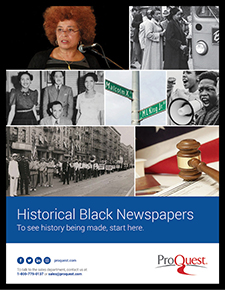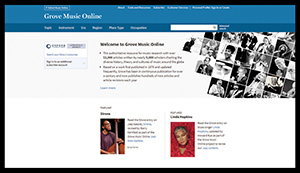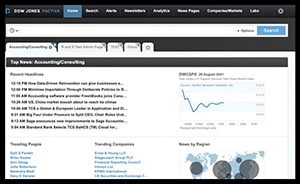Three Librarians on the Databases They Count On
Three librarians from specialized institutions, focusing on Black history and culture, the performing arts, and business, discuss their collections and explore several databases that are often the first resources they go to when fielding questions from patrons.
 Databases form a crucial part of many library collections. Three librarians from specialized institutions, focusing on Black history and culture, the performing arts, and business, discuss their collections and explore several databases that are often the first resources they go to when fielding questions from patrons. Librarians at other institutions seeking materials on these topics may also find inspiration and research paths.
Databases form a crucial part of many library collections. Three librarians from specialized institutions, focusing on Black history and culture, the performing arts, and business, discuss their collections and explore several databases that are often the first resources they go to when fielding questions from patrons. Librarians at other institutions seeking materials on these topics may also find inspiration and research paths.
 The Schomburg Center for Research in Black Culture
The Schomburg Center for Research in Black Culture
By A.J. Muhammad
Named after Arturo “Arthur” Alfonso Schomburg (1874–1938), the Afro-Puerto Rican bibliophile whose personal library forms the nucleus of the collections, the Schomburg Center for Research in Black Culture has for nearly a century been a repository of materials and artifacts that document the global Black experience. With more than
11 million items in its collections, the Harlem-based Schomburg Center, part of the New York Public Library system, serves patrons in New York City, as well as users all over the country and the globe, via a variety of services.
The Jean Blackwell Hutson Research and Reference Division, one of the five research departments at the center, houses the Schomburg’s published materials and other resources, including public workstations where patrons can access an array of databases. We frequently refer patrons to a selection of databases, including ProQuest Historical Black Newspapers, which contains the digitized version of major 20th-century Black newspapers such as the Chicago Defender, the Pittsburgh Courier, and the New York Amsterdam News. Researchers often seek facts about Harlem, and access to the Amsterdam News makes this database indispensable.
Another key database is the library version of Ancestry, from ProQuest; its suite of resources—including digitized U.S. Census and military records, and the U.S. Social Security Death Index, 1935–2014—has proved to be essential for patrons conducting genealogical research.
Independent Voices, an open-source JSTOR database that carries digitized alternative press titles from the 20th century, is a boon to researchers seeking publications from a Black, Latinx, Native American, LGBTQ+, or feminist perspective. This resource contains issues of two titles that are popular with Schomburg Center researchers, Freedomways and Muhammad Speaks.
A colleague reports that Black Studies Center, a Chadwyck-Healey product that recently migrated to a ProQuest
platform, is also a go-to database. Helpful to researchers at all levels, this rich resource contains full text articles from scholarly journals, digitized historical newspapers, essays by Black Studies scholars, and audiovisual clips.
Another colleague shared that Readex’s American Historical Imprints are useful for patrons researching historical documents about the enslavement of people of African descent in the United States. They contain a trove of resources that date back to the 16th through 19th centuries, such as books, pamphlets, broadsides, and government documents.
During the library’s closure due to the pandemic, the NYPL ensured that some of the databases that were only accessible onsite, such as Ancestry, were temporarily available to remote researchers. As the library has gradually reopened to researchers and restored services, patrons now can enter the physical building to access both the databases and the center’s renowned collections.
Access to the knowledge that these databases provide is vital, as it removes barriers to information at a time when the nation is experiencing a backlash against the teaching of painful and dark times that people of African descent, Indigenous people, and others have experienced throughout history. The databases also help us carry forward the mission of the Schomburg Center by highlighting the contributions that people of African descent have made to world civilization, one click at a time.
 The University of Illinois at Urbana-Champaign’s Music & Performing Arts Library
The University of Illinois at Urbana-Champaign’s Music & Performing Arts Library
By Kate Lambaria
The University of Illinois at Urbana-Champaign’s Music & Performing Arts Library supports the study and creation of dance, music, and theater on campus and in the local community. It is part of the largest public university research library system in the United States and holds approximately 500,000 physical items on site in various print and media formats, with more located in remote storage. Online databases, like those outlined below, supplement the library’s physical holdings and assist in the discoverability of physical materials as well.
Oxford Music Online is an ideal starting point for research on many musical topics. The platform provides access to Grove Music Online alongside The Oxford Companion to Music and the Oxford Dictionary of Music. Grove Music Online articles are written and edited by experts in the field and provide detailed overviews of thousands of topics, composers, performers, instruments, genres, and more. The biographical articles include important information about the lives of composers and performers and detailed lists that assist users in locating specific works in collected editions and monuments. Topical articles include extensive bibliographies, introducing users to the literature.
RILM Abstracts of Music Literature, available through EBSCO, is an excellent resource for discovering literature on music topics, since it indexes all document types, including periodicals, books, dissertations, conference proceedings, and festschriften from across the world and in many languages. The over one million records include resources on classical, jazz, popular, and traditional music. RILM also tracks literature in other disciplines such as anthropology, dance studies, and philosophy to provide an interdisciplinary context for the study of music.
EBSCO’s International Bibliography of Theatre & Dance with Full Text is a useful tool that indexes both scholarly and popular content, including the full text for more than 190 periodicals, such as Dance Magazine and New Theatre Quarterly, and 360 books and monographs. The database includes literature related to other performance disciplines such as film, mime, puppetry, and more.
An all-in-one tool for the drama student or researcher, Bloomsbury’s Drama Online provides access to scholarly monographs and full-text play scripts alongside audio plays, filmed live performances, and film adaptations. Bloomsbury’s efforts to enhance discovery are noteworthy and include “Advanced play search,” which lets users search for plays and monologues that meet specific criteria, as well as a browse feature that allows users to explore content based on theme, genre and form, and period.
Music and Dance Online from ProQuest similarly provides access to text-based resources alongside media content, which is important for the performing arts disciplines. Digital scores, millions of audio tracks of everything from classical and folk to jazz and popular music, and thousands of streaming video performances, master classes, and interviews can be accessed on the same platform as 19th-century periodicals focusing on American musical life and important reference works such as the Garland Encyclopedia of World Music, the International Dictionary of Black Composers, African American Music: A Chronology: 1619-1995, and Jazzwomen: Conversations with Twenty-One Musicians.
 Lippincott Library of the Wharton School, University of Pennsylvania
Lippincott Library of the Wharton School, University of Pennsylvania
By Marcella E. Barnhart
The Lippincott Library of the Wharton School is the business library at the University of Pennsylvania. Endowed by and named for Joanna Wharton Lippincott, daughter of Wharton School benefactor Joseph Wharton, the library opened in 1927. While the collection covers all business disciplines, it has a particular strength in finance to align with curricular and research needs, and we license several commercial financial products that are tools of the trade for financial professionals, such as Bloomberg and S&P Capital IQ. The below databases are especially helpful for our users.
For company and deal information, PitchBook is a relative newcomer on the academic library scene. As its name implies, PitchBook started out as a resource focused on venture capital and private equity, but it has grown to include public company information after its acquisition by Morningstar in 2016. Beloved by MBA students for its intuitive interface and personalization features, PitchBook includes financing histories and information about executives and board members on the company side, while analogous investor profiles cover investments, team members, and lead partners on deals.
Public company information also includes full financials, filings, and stock price information. PitchBook has created a proprietary industry classification system and series of technology-oriented verticals that allow for creative screening in emerging areas such as artificial intelligence and machine learning. While downloading is quite limited within the web interface, the Excel plug-in allows for more extensive downloading of public company information. In addition to company, investor, and deal information, PitchBook publishes regular reports that cover funding trends and statistics.
On the other side of the spectrum in terms of experience with academic libraries is Factiva, a tried-and-true workhorse from Dow Jones & Company that has been a staple in academic libraries for about two decades. Factiva’s news pages allow users to easily keep up with key general and business news sources like the New York Times, Wall Street Journal, and Barron’s, but its strength lies in the additional 33,000-plus indexed information sources. It’s valuable both for users seeking basic news on larger companies (through either the specialized companies & markets area or through a regular search) and for those looking for hard-to-find information on tiny private companies. Unlike other systems, Factiva has maintained its sophisticated features for power searchers while also providing straightforward options for the average user. The extent of Factiva’s coverage makes it a little too attractive at times, as Wharton faculty members and doctoral students sometimes attempt to scrape or text-mine the data, which is not permitted under our academic licensing agreements.
IBISWorld’s industry reports are frequently requested by Wharton students who find them via a web search, rather than through the library website, as a result of the company’s mastery of search engine optimization. As with Factiva, IBISWorld’s strong suit is its breadth of coverage. It produces reports on standard industries by North American Industry Classification System (NAICS) code but also on industries that don’t fit into conventional classification systems, from aerial work platform manufacturing to meal kit delivery services to high frequency trading. Regardless of the industry, reports have a standard structure, covering industry performance, outlook, competitive landscape, and operating conditions; historical reports are available, which can be useful for academic research. While coverage is most robust for the United States, modules are available for other countries and even for several specific U.S. states.
A.J. Muhammad is a Librarian in the Jean Blackwell Hutson Research & Reference Division at the Schomburg Center for Research in Black Culture. Kate Lambaria is Music and Performing Arts Librarian at the University of Illinois at Urbana-Champaign’s Music & Performing Arts Library. Marcella E. Barnhart is the Director of the Lippincott Library of the Wharton School, University of Pennsylvania.
RELATED
ALREADY A SUBSCRIBER? LOG IN
We are currently offering this content for free. Sign up now to activate your personal profile, where you can save articles for future viewing









Add Comment :-
Comment Policy:
Comment should not be empty !!!